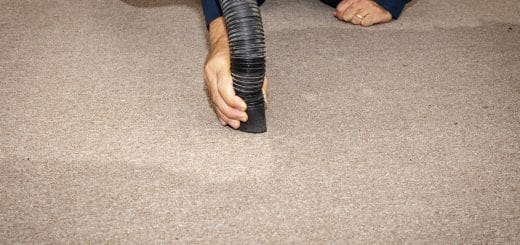How To Avoid Basement Floods In Winter
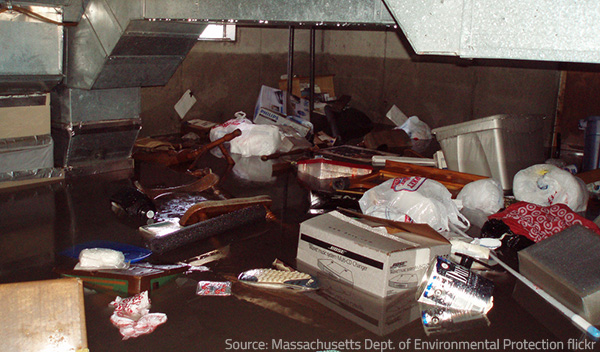
You don’t want to see this happen to your basement!
It is common knowledge that the necessary supplies for a severe winter should be provided before the first snowflakes begin their chilling dance. Piles of dry firewood, propane tanks, sacks of flour and rice, jars of honey and jam, cooking oil, dried fruits, potatoes, or home-made pickles – whatever you need to survive several weeks without electricity and regular deliveries due to heavy snowfall, blizzards, or ice should be gathered before the winter. All of the above provisions will be typically stored in your basement – sheltered and easily accessible. But the whims of Mother Nature can threaten even that safe place.
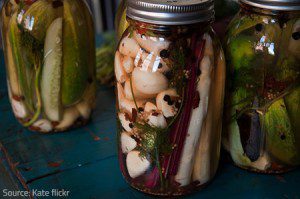
Preserve well the treasures in your basement.
While getting ready to listen to the snowstorms whistling in your chimney, you need to remember that one of the most common winter disasters is basement floodingFlooding is the overflow or accumulation of water in areas t... More. It results in ruined provisions and severe water damage to your property which can be particularly troublesome during the cold season. Basement flood cleanup is, of course, offered by professionals but you’d be better off avoiding the misfortune altogether.
Here are some strategic tips to help you prevent winter flooding:
Prevention Measures Outside Your Home
Without a doubt, your well-maintained home will provide you with a reliable and cozy shelter even in the most adverse weather conditions. Look after your property with care and it will pay you off with a warm and problem-free winter experience.
Important Steps To Take During The Fall
-
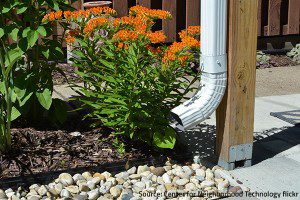
Find a way to direct water safely away from your house.
Have the roof and the walls of your house carefully inspected. If necessary, improve the overall condition of your property before the arrival of winter: replace any broken tiles and secure loose or misplaced ones; put a cap over the chimney; repairRepair is the act of fixing or restoring damaged property, m... More cracks or openings in the walls; restore loose or crumbling plasterPlaster is a building material made of lime, gypsum, or ceme... More; insulate the windows. All of the above will help prevent leakage and floodingFlooding is the overflow or accumulation of water in areas t... More but if you want to secure your basement properly, pay attention to the foundations. Provide plenty of reliable insulationInsulation is a material used in buildings to reduce the tra... More and make sure water drains as far away from your home as possible;
- Ensure proper drainage: replace damaged or rusty drainpipes; remove any leaves and debris from the eavestroughs and downspouts; disconnect the downspouts from the sewer system whenever possible to forestall back-up of waste water; make provisions for the water to drain away from the house walls;
- Arrange for the grading around your house to slope away from the foundations. If possible, this will really make water drain away and will help a great deal to avoid floodingFlooding is the overflow or accumulation of water in areas t... More;
- Install porousPorous describes a material that contains small openings or ... More pavement and grow lots of plants around your house. They will help absorb excessive water quickly;
- Clear the catch basins nearby. You want the water to flow off your property without obstructions, right? Then maintain drainage swales and catch basins free of debris.
When The Snow Starts To Fall
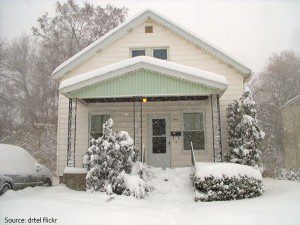
Beautiful as it is, snow should be removed from your house.
Your house may look like a fairy-tale dwelling tucked in the sparkling snow but you need to clear it as soon as possible. Begin from the roof (too much snow may even cause the roof to collapse), then remove any snow and ice from the vestroughs and last but not least – clear the area around the foundations of your house really well. Remember that water can enter your basement through a tiny crack – one you may have never even noticed. So you need to be really cautious when trying to avoid basement flood and the subsequent water damage.
Since frozen ducts are another common cause for winter floodingFlooding is the overflow or accumulation of water in areas t... More, be sure to take adequate measures and avoid the disaster before it strikes. Also, keep your downspouts clear of ice and snow, otherwise water will overflow and flood your basement before you know it.
What To Do Inside Your Home
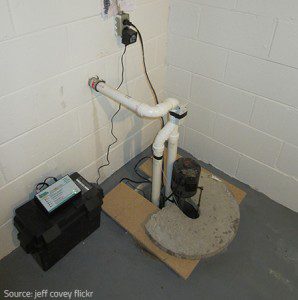
Sump pumps are useful contraptions indeed.
The perfect working condition of your plumbing system is, of course, a must. Having all your pipes and valves checked, cleaned and repaired accordingly is quite a good idea. Still, consider purchasing adequate absorbent materials, just in case.
The best basement flooding solution, however, remains a sump pumpA sump pump is a pump installed in a basement or crawlspace ... More. Make sure yours is working properly or get hold of a new one immediately. The pump can really save the day (and all the possessions in your basement)! However, mind the fact that it needs electricity to operate, so if there is a danger of power breakdown, install a back-up power source.
Also, if you want to avoid great losses and facilitate eventual basement flood cleanup, try to:
- Never place carpets on the basement floor because they retain water;
- Put your belongings on shelves to keep them above water level during a basement flood;
- Avoid installing electrical devices in the basement;
- Never store items of high emotional or monetary value in the basement – there are better places to keep your valuables.
Water damage restoration is extremely difficult during the winter season when items can’t dry in the sun. Follow our effective tips to avoid floodingFlooding is the overflow or accumulation of water in areas t... More and secure your warm and comfortable living space. Instead of dealing with perfectly avoidable misfortunate events you will be able to enjoy the beautiful magical world of ice and snow.












